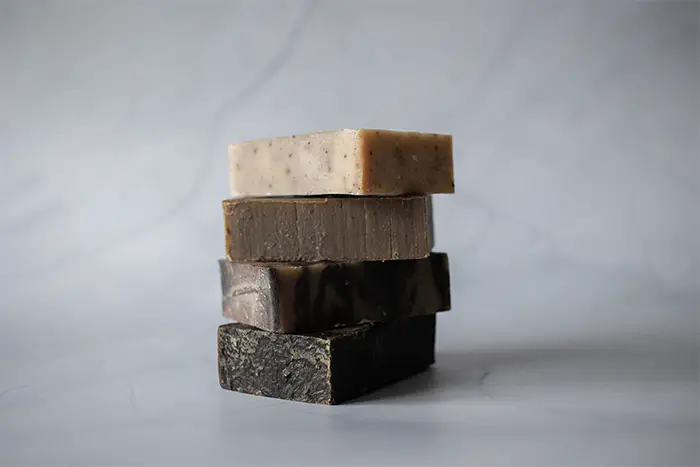
For generations, African black soap and Castile soap have been celebrated globally for their natural, gentle cleansing abilities. Crafted from vegetable-based ingredients, these soaps are renowned for their kind yet effective cleansing and conditioning properties, making them excellent choices for both skin and hair care. In this guide, we’ll explore the distinct qualities and benefits of these two timeless soaps.
Table of Contents
- What is African Black Soap?
- What is Castile Soap?
- Unveiling the Ingredients: African Black Soap vs. Castile Soap
- Diverse Uses: From Skincare to Household Cleaning
- Comparing Liquid Soaps: Key Differences and Uses
- African Black Soap and Castile Soap: Skin Care Benefits
- Choosing Between Black Soap and Castile Soap for Hair
- Side Effects: What to Expect from Each Soap
- Conclusion: Which is Better – African Black Soap or Castile Soap?
What is African Black Soap?
Originating from West Africa, African black soap is a completely natural soap known for its distinctive soft or hard brown texture. Traditionally, it’s crafted by blending hot palm oil or palm kernel oil with plantain peel or cocoa pod ash. Modern versions of this soap often incorporate additional ingredients like essential oils, enhancing its natural benefits.
What is Castile Soap?
Castile soap is a plant-based soap originally from Spain. It’s traditionally made using 100% olive oil and sodium hydroxide for bar soap, or potassium hydroxide for liquid soap. Nowadays, it often includes other vegetable oils like coconut oil and fragrant essential oils.
Unveiling the Ingredients: African Black Soap vs. Castile Soap
Depending on where the soap you purchased was made, original African black soap can have a combination of the following ingredients :
- Plantain peel ash
- Palm oil (Nigeria)
- Palm kernel oil (Ghana)
- Cocoa pods ashes
- Coconut oil
- Olive oil (Morrocan black soap)
- Shea butter
- Cocoa butter
Common additives include eucalyptus essential oil, lavender oil, camwood, aloe vera, honey, lime etc.
Traditional Castile soap is made with 100% olive oil and sodium hydroxide (caustic soda) for bar soap, or potassium hydroxide (caustic potash) for liquid soap. However, it is common to find more modern bars with other vegetable oils such as:
- Coconut oil
- Jojoba oil
- Hemp seed oil
- Sunflower oil
Castile soap can have various scents depending on the essential oils used.

Diverse Uses: From Skincare to Household Cleaning
African black soap is primarily recognized for its skincare benefits. Renowned for its gentle nature, it boasts antibacterial properties ideal for a range of skin types. Studies highlight its effectiveness as an antimicrobial, acne-fighting, exfoliating, and skin-tone evening agent, also known for fading scars. It’s versatile enough for use as a facial cleanser, exfoliant, body wash, and hand soap.
Castile soap, on the other hand, offers a wide range of applications. It’s suitable for personal care, functioning as a body and hand wash, shampoo, face wash, and makeup remover. Additionally, it’s an effective household cleaner, used for laundry, dishwashing, as an all-purpose cleaner, and even as a bug deterrent. Castile soap stands out for its versatility in both personal and home cleaning needs.
Comparing Liquid Soaps: Key Differences and Uses
Below are the similarities and differences between both liquid soaps, African black soap and castile soap.
Similarities
- Both are 100% vegetable-based and toxin-free
- They are affordable and easy to use.
- Gentle and can be used as facial cleansers and hair shampoos
- Both are eco-friendly, biodegradable, and leave no polluting trace in the environment.
- They are equally gentle on the skin.
Differences
- Liquid black soap can kill bacteria due to its antibacterial properties while Castile soap simply washes away bacteria.
- Liquid black soap can be very messy to use because of its brown color compared to Castile soap which has a clear color.
- Castile soap can have a drying effect when concentrated and thus needs to be diluted before use. This is not the case with liquid black soap.
African Black Soap and Castile Soap: Skin Care Benefits
Both Black and Castile soap have great benefits for the skin. Both have moisturizing (1, 2) and inflammatory properties (3, 4) as they are made with nourishing shea butter and olive oil.
African black soap contains shea butter which is a known remedy for dry and itchy skin. Castile soap is made with olive oil which contains fatty acids that help boost the skin’s hydration.
However, African black soap has the advantage of being more suitable for all skin types. It is gentle enough for sensitive and dry skin and at the same time can help control the production of oil in oily and combination skin types. Castile, on the other hand, can have a drying effect when used concentrated. Making it less appropriate for dry and sensitive skin.
African black soap equally has great antibacterial properties that help protect the skin from infections such as acne.
It is known to improve skin texture by eliminating uneven skin tone. It equally works to eliminate and soothe razor bumps caused by ingrown hairs and skin rashes.
Added to this, a study on traditional soap revealed that African black soaps can be used to fight skin yeast infections like Candida Albicans. This is not the case with castile soap.
Choosing Between Black Soap and Castile Soap for Hair
Castile soap is an ideal hair cleanser for sensitive or eczema-prone scalp. It is gentle and helps soothe irritated scalp thanks to the anti-inflammatory properties of olive oil.
African black soap, on the other hand, with its antifungal properties, is effective in helping to eliminate dandruff from the scalp. Although there is not enough scientific data to back this up, it is believed to help boost hair growth by cleansing the scalp and providing a healthy environment for hair follicles to be properly nourished.
Both are great for the hair, however, they should be used with care to avoid drying out the scalp.
Side Effects: What to Expect from Each Soap
Whether for hair or for the skin both of these soaps need to be used with caution as both have a few side effects.
Side Effects of Castile Soap
- Liquid Castile can cause dryness in the skin and scalp if used undiluted
- Experts recommend never using castile soap on colored hair as it is a strong alkaline and can wash hair color off.
- Also when using castile soap when combined with lime or apple cider vinegar can leave an oily film on the hair.
Side Effects of African Black Soap
- The main side effect of African black soap is that it may cause dryness in some people. Although recommended for all skin types, people with sensitive and dry skin need to proceed with care and start using it in small amounts and not leave it on the skin for more than 90 seconds.
Conclusion: Which is Better – African Black Soap or Castile Soap?
In deciding whether African Black Soap or Castile Soap is better, it really comes down to your personal needs. African Black Soap is a great choice for skin care. It’s gentle, helps with acne, and works well for all skin types. It’s especially good for evening out skin tones and fighting bacteria.
Castile Soap is more of an all-rounder. It’s not just for your skin; you can use it around the house too. It’s a good pick if you have sensitive skin, but remember it can be drying if used in high concentrations.
So, if you’re looking for a soap that’s great for skin care and can handle a variety of skin issues, African Black Soap might be the better choice for you. But if you want a soap that you can use for more than just your skin, like cleaning around the house, then Castile Soap could be the one. It all depends on what you need the soap to do for you.

Petra Nakashian (previously Kravos) is a dedicated natural health and beauty blogger, driven by the loss of her parents to cancer, which led her to meticulously research beauty product ingredients. With over 10 years of experience, her in-depth knowledge has made her a trusted expert in the field. Founder of Be Healthy Now and Green Beauty Talk, Petra recently expanded her expertise with Beauty Insights Hub, exploring a wider range of beauty treatments. Committed to transparency and honesty, her work is a vital resource for navigating the complex world of beauty.

